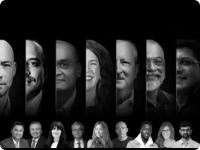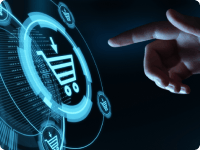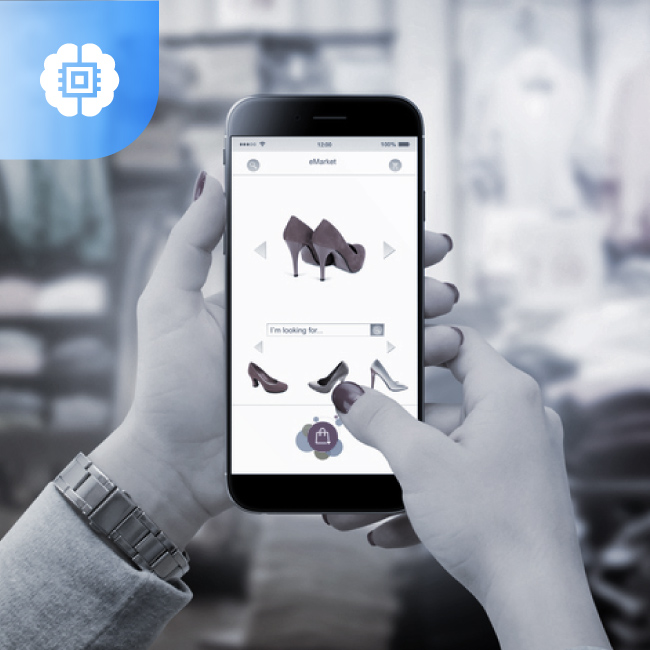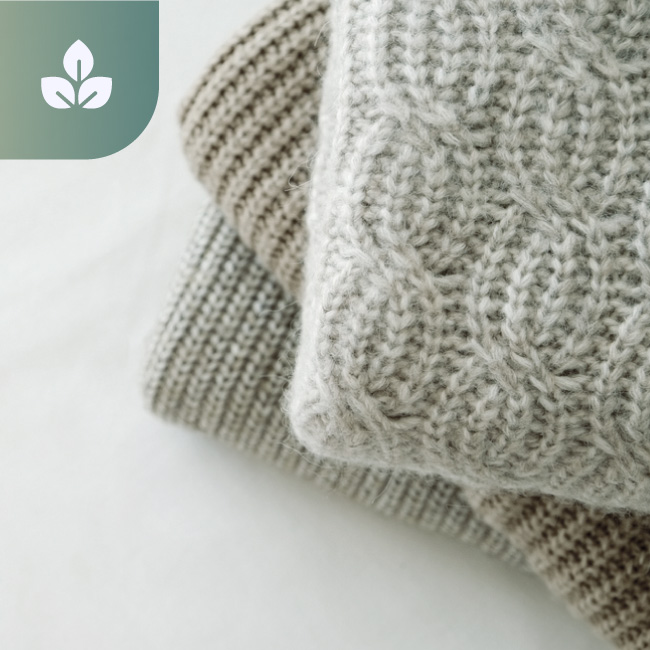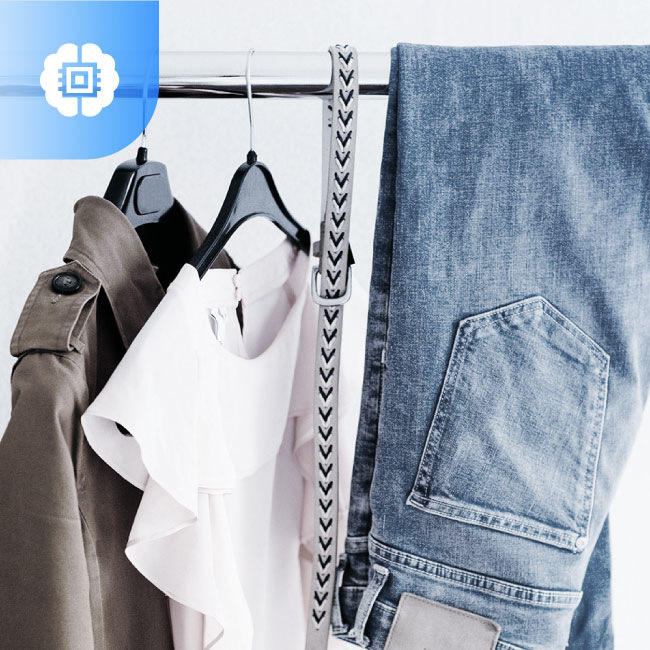
Leveraging AI To Create Unforgettable Shopping Experiences: The Milaner Story
Meet Elisa Rossi, Co-Founder of Milaner, a brand that’s completely changing the way people shop for luxury as we know it. Milaner is a D2C business that connects its luxury artisan partners with its customers on a first-name basis, bringing its products to life through insider access and never-told-before stories. Rossi was born and raised in Italy, in a beach town that is the European hub of luxury shoe manufacturing. She came to the US as a scholar at UC Berkeley, started her career as an NLP engineer, then moved on to a business leadership position at Apple. She’s also worked extensively with startups like Square, Eventbrite and Yik Yak – so she’s got the amazing experience of working at the intersection of fashion and technology throughout her career. Here’s the story of a brand that’s HEAVILY leveraging AI technology to build the kind of shopping experiences that people will never forget.
Episode Transcript:
Akshara Subramanian
Hi everyone and welcome to a new episode of The Retail Podcast by Vue.ai. I'm Akshara the head of Customer Marketing and Growth at Vue.ai and today is a pretty special episode for us. Our podcast guest is someone who's got a star studded professional background and someone who's been at that perfect intersection of fashion and technology. Meet Elisa Rossi, the CEO of Milaner. Elisa was born and raised in Italy and she came to the US as a scholar at UC Berkeley, then started her career as an NLP engineer and then moved on to a business leadership position at Apple. She's also worked extensively with startups like Square, Eventbrite and Yikyak. We've also got Julia Dietmar Vue.ai's chief product officer and I'm super excited to be in conversation with both of them today. Welcome, Elisa and Julia.
Elisa Rossi
Thank you for having me.
Akshara Subramanian
Hi. So Elissa we'll Just quickly start off with you and talk a little bit about Milaner. You know, so you've always mentioned that, you know, you're very excited to know about the origin and the story of an artisan partner and having built an entire business model based on this. What is it about the artisan story that really inspired you to start milaner? You know, because most luxury brands prefer not to publicize or talk about their supply chain. But how did you go about finding these artisans and were they open to participating in getting featured on the platform?
Elisa Rossi
Ok, so this is a great question, so thank you for asking and it allows me to talk about so many things. Obviously, this business is extremely personal to me. I was born and raised literally in one of the main hub of luxury shoe manufacturing in Italy. So, you know, growing up in the middle of the hustle and bustle of luxury manufacturing workshops, I had like a few in the same block where my house was. I grew up shopping for luxury in a way that many people around the world did in boxes too, which is literally walking into the luxury manufacturing workshop, introducing myself to the artisan, building our relationship with them, picking the leather, picking the things that I know, the way I wanted to personalize my luxury goods and just having products custom made for me. And I was obsessed with this, specifically with custom boots when I was a teenager, fashion custom boots actually led me to a friendship with my current co-founder, Serena Spinucci. Serena is currently living in Switzerland, but we grew up in the same hometown and we went to high school together and we were both like custom boots like fans. And we used to shop from the same local manufacturer. So you know what happens when you emigrate, when you leave your country and you live abroad for a long time? The way it happened to myself and Serena is that you gain new insights on the value of your hometown, because you get to see you from the outside looking in and you see what's missing in your new found land and you see also what the opportunities are. And so I think for me it was clear. 14 years after landing in the United States that the experience to me, incredibly luxury experience of shopping straight from the source was missing or no one I knew here in the United States had experienced that. And every time I was telling the story of my upbringing in Italy would absolutely be fascinating to them. And so that's an opportunity. I immediately saw how a democratizing access to luxury manufacturers in Europe could be a successful business model for a number of reasons. You know, like obviously, consumer trends in the industry right now are calling for transparency, authenticity, customization and affordability. And all of these things make perfect sense to me. I was like, yeah. That's the way I used to shop growing up. So, yeah, it's literally like taking my childhood experiences and like democratize the need for everyone outside of Italy.
Akshara Subramanian
Right. And can you tell me a little bit more about, you know, just the relationship that you're building with these artisans, like how is that process for you? How do you approach them? what does it take to convince them to be on a platform like this?
Elisa Rossi
Yes, so luxury manufacturers. We started with Italy, obviously, because it's my hometown and because it is absolutely the cradle of luxury manufacturing in the world that our family run businesses that have been doing this for decades. A lot of them started in the 1950s, 1940s, and they essentially became the de facto manufacturers for the main luxury names. So, Chanel, Louis Vuitton, boutique abano terme, Prada, you name it. They are manufacturers in Europe. So It's a known fact in the industry, They're working with the manufacturers are usually challenging because, these are people who perfected the craft and spend their whole life just focusing on making beautiful products. And so then obviously develop so much business development skills, the language skills, the marketing skills that you need in order to run a business and go after you go to market and go after customers. So when you approach them, obviously, relationships are very important. Knowing how to speak to them in their own language with the right attitude is extremely important. Knowing how to build a rapport with them is key. And Italy, like a lot of other countries in the world, is definitely a place where business etiquette has a lot to do with personal relationships. So when I first came back from the United States a couple of years ago and tried to recruit the first few artisan partners, I was very American in my approach. I had a PowerPoint presentation and, you talking about business metrics, the opportunity in the market and I felt like I lost the attention of a lot of manufacturers. So I quickly kind of reminded myself of my Italianess and what it takes to build relationships in Italy and I changed my approach really quickly.Now it's really about building a relationship and I think after you do that and they trust you and you become part of the family and you go for dinner with them and their family, literally an amazing business relationship opens up. And now we are at a point where we feel we can literally start any kind of business collaboration with them because they're very open to our support. They're very open to us guiding them into new business opportunities.
Akshara Subramanian
Right. Actually, before we started, obviously, Julia, we spoke a little bit about you shopping from a Milaner, in fact. So obviously you've been around this site. What do you feel is so compelling about Milaner's business model that makes the experience of shopping so different from any other web site or any other space?
Julia Dietmar
Oh my gosh. Where do I start? I think a good place to start is we are getting into the age where consumerism and buying a lot of quote unquote cheaper stuff is being realized as not good for the environment. It's overloading our closets is basically filling our landfills. So this movement to getting at affordable luxury and products that are more classic that will last you a lifetime and off course the products that you can buy at a fraction of this huge ultra luxury brand names, that is where the main attraction comes for me personally because I know that I can buy a leather jacket, a leather bag, it'll last me years and years and years. And I do have things in my closet that I bought from big brands that I've actually owned for a number of years and I still love them. There are still in great condition and those are the products that are a good investment. So where do we get good investment with good quality at a reasonable price? And you know, it comes from the same people, same hands that make big brand products. Right. So for me, that is the big thing. And it feels like you're buying fewer products, but better quality, which can go with any trendy product that you might buy in season. And you feel good about yourself, you'll feel good about environment. You know that you're buying quality products. So this is where my main attraction and I'm sure, Elisa, you probably have heard this from your other customers. My question to you is actually twofold. One is, have you had any. How should I put it? Any pushback from those big brands in any way? Because you are basically approaching the same artisans. And then the second question is for artisans. How are they perceiving this is completely new business model for them, right. They're basically going direct to consumer. They are now not only in the role of a manufacturer, but also somewhat in the role of a designer. How is a change in it for them?
Elisa Rossi
Yeah, These are great question. So to the first question, no, there's no absolutely no issues. We don't call out the names of those brands in association with the name of the artisans. So that doesn't get in the way of any potential business contract between the manufacturer and the luxury name on top of that. Very rarely do artisans sign exclusivity agreements with those brands so they can work with other brands, other luxury brands, other startups like whoever the one to start engaging with. It's up to them. So there's absolutely hasn't been any pushback or any issue of any type. And we're doing everything like legally, everything is clean. To your other question, actually, what it turns out is that I had no clue that the reception to this business model with luxury manufacturers in even my own town was going to be so positive. And a lot of people actually discouraged us at the beginning from starting the business, seeing the luxury manufacturers aren't going to have time to engage in your business models because they're very traditional people. They're very busy with big luxury brand work. And they're just not very flexible, which turned out to be not true at all. In fact, I think offshoring practices by the biggest luxury brands over the last 10, 15 years, I've definitely eroded business for everyone in the kind of traditional European luxury manufacturing industry and also created unemployment. Obviously, things that are in positive, but also the things that are very positive, such as openness to doing things differently. So we came in and we started pitching a collaboration with Milaner. People were like, OK, yes, we are ready for this. You know, this is exactly what we were waiting for. And this is what we're ready to get our name out there, because getting our name out there and getting our story out there. well first thing makes us proud. And our name was never told by anyone. And secondly, it allows us to make our business more sustainable and less dependent on the big luxury brands, you know, just kind of eliminating that dependence, business dependence on them. So it was powerful. And on top of that, we asked them, what do you love making? And when you ask them that question as opposed to showing up with very specific design mockups of things that you want with a product manager trying to like micromanage you on executing on those designs. Well, the whole relationship and the whole attitude changes. They start showing us their favorite products, like their favorite techniques, the things that they've always made with pride because it's their favorite thing to make. And if you start your kind of product planning with those things in mind, you will always come up with something that is very successful commercially because usually you can see talent. You can see when something is made with love and is made with years and years and years of experience poured into it. But it's also something that makes them extremely proud to be a part of this and to showcase their best work. So ultimately, it's really a win win.
Akshara Subramanian
Wow. That's a fantastic story. I know. In fact, I was just so stunned by the answer. I was like, oh, my God, how am i go ahead with my next question. But I also wanted to ask you a little bit about how the name Milaner itself came up. Does it have an interesting story that you can tell us about?
Elisa Rossi
Absolutely. So the name Milaner comes from actually Milaner, I guess is an old English words, that means a native of Milan. And it's the word that Milliner comes from. So Milliner, which is the hat artisan comes from Milan because all of the best hat artisans in the fifteen hundred used to be from Milan. So it's really a word that embodies all the luxury manufacturers. It is a hint to Italy, which has been like the cradle of luxury manufacturing for years and it's also a tribute to our very first artisan partner who was a milliner, an Italian milliner who was in Paris. So it's our way to celebrate her and inspiring us to to do what we're doing.
Akshara Subramanian
Wow. Fantastic. So, Elisa, with brick and mortar stores focusing on experiential retail and personalized experiences. You know, e-commerce retailers should generally try and aim to improve the online experience for the consumer. And they should also be in touch with traditional retailers who know the craft. Right. So how do you see this story for Milaner going forward? Do you do you want to continue to highlight the artisans work through different types of storytelling? How do you plan to do that?
Elisa Rossi
So first and foremost, you know, I worked at a number of technology companies in San Francisco and one of them is Square and Square, you know, really was a pivotal point in my career because we were building tools to empower small and medium sized businesses, grow their business and run their business. And that, you know, when I think about that experience, I definitely see the point where I was able to connect the dots between luxury manufacturers and my background might tell where I wanted to be in the future. Right. So there is a big opportunity in literally creating offering tools, services and a platform for luxury manufacturers to grow their business and around their business. And it's even clearer as I start working with them in a more hands on way. There's a number of services into us right now that we're focusing on offer you to them as part of us, enabling them to sell direct to consumer for the first time in terms of services. There's merchandising, product design, there's photography, marketing, go to market, you know, different types of marketing channels. So we do that for them so that we literally like allowed them to focus only on the one thing they're supposed to be doing, which is making an amazing product. And then, of course, then we offer technologies and we offer a technology platform. And this is really kind of the area that for me, as someone who's worked in technology for so long and started as an engineer is extremely exciting. Experimenting with intelligent retail automation is obviously one of the first things that really excited me about getting into the retail industry because it was not an Industry i was familiar with. But I saw so many opportunities. And now you can slice different types of data and shopping data and create amazing experiences with that. So obviously for us, the challenge is how do we kind of take all of the data and note of that information and how do we use that to empower luxury manufacturers, which is something we're working on right now, and I think there are some extremely powerful applications that we haven't even explored yet. But we're going to and currently we're just starting with like the basics of using kind of AI in kind of the retail world, which is, you know, just kind of breaking down data, analyzing data and understanding how to use it to both enable personalization and personalized experiences for our customers or shop online. Right. As in forming merchandising decisions, which is currently actually a really important part of what we do both for ourselves as a business, but also for the manufacturers. So what should we make? What should we make more of and where should we make less off? And this is data that we can easily kind of learn about through AI and through the power of of data on our website.
Akshara Subramanian
Right.
Julia Dietmar
I am very excited for data specifically for your business, Elisa, because since everything is made to order and says designs are produced by your artisans, you can even give them hands on which product attributes are being more or less favorite set by your customers in a sense that you can say, all right, this bag in this color or with this type of design details does better than something else and it all can come from data. And on top of that, you can basically give them for a bag if you put this product attributes together. It's probably going to sell like hotcakes. So things like that for a business like yours, I think is super, super powerful.
Elisa Rossi
Absolutely. And actually, you know, it's been thanks to you guys that we kind of started our journey into AI. So talking to you, Julia, and really like brainstorming together, it was almost like this is really this is one of the most exciting conversations that I've had in a long time. Because the opportunities are limitless.
Julia Dietmar
Well, thank you.
Akshara Subramanian
All right. You know, Elisa, you'd actually mentioned I think this is kind of piggybacking off the previous question, which is, you know, you'd said we want to use technology to create a real bond between the artisan and the person who will eventually be owning the product. Right. So in what way do you feel in the future that AI can help with these things in terms of just how the experience will be for the end shopper?
Elisa Rossi
Well, we have so many ideas on this front and so many different ways of using the data to create powerful experiences for a customer. Obviously, I would love to recreate, to literally reenact my experience of walking into the luxury manufacture workshop when I was in Italy. And I could see that type of leather going with that sweater. So I think one of the things that I'm really excited about is being able to curate collections for our customers. And in a way as you mentioned everything's made to order on our website. So we can be extremely specific on the type of collections that we can create and we can create things that perhaps if you were to shop online just off the shelf products, you will never be able to experience. So I think in the future and this is the most certainly something we're working on, there's going to be applications where customers are almost going to feel like they're stepping into their design workshop and they're having the artisan guiding them through how to make something that's just specific for them, like where you feel like your uniqueness and your taste and your everything about you is reflected in the stock selection that you end up with.
Akshara Subramanian
Right. You know, Julia, I think you'll also be able to add to this a little bit in terms of how everything is going towards just creating these incredible experiences, whether it's online or offline. We have like we have stores like Nordstrom Local. It's all about efficiency where shoppers go to this store and they only just pick up what they've ordered online and then they have an on site sort of tailoring there to make sure that what they're doing. I mean, what they've shopped for, is exactly what they want. And similarly, the stores like Forty Five Ten, which will do like the best 10 pieces of a trend, they will not like showcase an entire collection. So everything is very curated for shoppers today. So how do you feel that, you know, this sort of business model will help in creating those type of experiences?
Julia Dietmar
Well, obviously, I'm super excited about it right. we've been working on really perfecting individualization for every single customer. How do you put the right product in front of her that is in her style, fits her body perfectly, works with whatever else is in her closet. So this is something that I think companies and businesses that produce breath of garments and clothing, but also something that can be very personalized and very much tailored to individuals. Taste is super important. Now, we've been also talking a lot about visualizations. And I know that a lot of our customers and a lot of investors have been asking and talking about virtual fitting rooms and how a customer shopping online or even shopping in the mall without walking into a particular store can try on clothing virtually. And this is something that is also super exciting. It's not necessarily about actually trying things on and seeing it on your body, although eventually that might also be great when technology catches up. But right now for me, is visualization of how a garment of a certain size looks on the body of that size is super powerful because we know that even handbags. Right. handbags are not a size specific, but they sort of are just kind of seeing how the bag looks against the body because visualizing is it the big bag, a small bag is not not super easy when you're just looking at the picture of a handbag and then wait for one of our clients when we started doing that. We learned that the sales have not only increased, but returns have decreased, which is a big deal. So all of this things personalization, visualization, curating individual collections for customers. I think this is where the future of retail is going to be headed. And we're already starting to see a lot of that being developed. And technology is definitely catching up.
Akshara Subramanian
Right. And Elisa, because you've been at that intersection of both tech and fashion, have you seen anything fantastic in the last, say, one year in terms of experiences or brands that have been doing something fantastic to go sort of out of the box and do something really cool online or offline?
Elisa Rossi
Well, I mean, I guess a very, extremely cool application that I've seen recently hasn't worked quite perfectly for me yet. But I think there's definitely a lot of room for improvement. And it's exciting is AR. So the ability to really like point your phone at your feet and see what shoes look like on you that you're trying to shop online or a hat. In fact, it's extremely powerful. I'm thinking for something like a hat where, you know, it's so hard to shop online cause it's hard to see kind of how we would fit with your kind of skin complexion or hair or right shape of your face. So being able to kind of use AR to get a glimpse of that and kind of pre contested it from your computer is really fun and really powerful for your online shopping experiences.
Akshara Subramanian
When I think about visualization, I, you know, I keep thinking of all these digital models. Right. Like, you know, Noonoouri who is on Instagram. And she's a digital model. And, you know, people visualize their outfits, brands actually send Noonoouri clothes and they actually have it on Noonoouri on Instagram and there's multiple other digital models. So. Julia, what do you think about this whole trend of digital models in the future for visualization of how garments and costumes will look on people?
Julia Dietmar
Yeah, absolutely. Digital models are going to be very powerful for this visualizations because on model photography is very expensive. Not only it's expensive, it's time consuming,it's very expensive to get all samples of clothing and every size and style, each model and photograph. So digitizing that whole process is going to be not only cost savings but for retailers, but also it will be very important in increasing intend to purchase and decreasing returns, as I said before, because visual visualization plays a very powerful role. Interestingly, this morning, I actually read an article about future in retail also being live streaming, which I thought was kind of interesting because and I and I thought about you Elisa because I just ordered the bag on your site and I'm like, well, I would. I kind of curious how they're actually making it So this kind of life streaming and I've seen kind of examples of with when you see your bag being made for you and that's actual bag that's going to be that's being made and then it's going to be shipped. And there are all kinds of applications of it that could be fun, engaging for customers, make customers feel like they're part of the process and they're really connecting with that artisan. I think that could be extremely interesting.
Elisa Rossi
We have days of footage off. Serena and I, with our partners in the workshop. Like, you know, just taking videos of know the bags being woven or just like how you make a sweater. So we have a lot of that. And we're still trying to figure out the best way of surfacing it so that you can really feel like it's authentic. You know, we I think like social media is just the best way of really surfacing this content. I think we get to a point where like a lot of fashion brands are over editing everything about their customer experience. Right. And, you know, everything just looks so incredibly Photoshop and perfect and gorgeous and polished. But I think we are slowly but surely going into an area where people do crave the realness, you know, connection, do things that are real connection to the things that are not as edited, just like unfiltered. And I could just religiously shooting from like going live from an artisan workshop is the kind of the most extreme example of that.
Akshara Subramanian
Ok, Elisa, I have an interesting question. So I remember when Levi's was doing sort of a custom, you know, they were creating custom jeans from the early Levi's Five O one collection. They were sort of sewing in, you know, the artisan's name onto the jeans so that the people that bought it would always remember that somebody special created this, you know, these jeans for them. So is there anything is any sort of like signature style of an artisan that the customer gets to see or is that something that's part of your narrative?
Elisa Rossi
Oh, you mean in terms of customizing , monograming, things like that?
Akshara Subramanian
Yes. Things like that. But again, that is like a signature of that particular artisan or something that's very specific to their style or their technique.
Elisa Rossi
So, I mean, currently we lack customers customize their products in a number of ways. Obviously not completely redesigning a product. But if you have a very direct relationship with our customers, I call myself almost like the chief customer officer because I spend more time doing customer service and talking to customers than anything else. And they request those sorts of things obviously from sizing. So being able to have extremely large feet, there is a lot of requests for like large sizing to monograming to having their name hand stitched in gold in the inside of a hat too. So we do all of these. We make leather jackets to order to your specs. So just like taking into account your unique measurements and all of this things obviously go a long way in differentiating us, but also reminding people about our brand and what why we do what we do and creating that unique connection. So. So, yeah, I think like the the artisan unique signature, really is the product and the technique used in making that product. So there's an artisan who specializes in making amazing woman leather handbags, which I think is the one that Julia purchased and other artisan specialize in other things. There's one who makes incredible handmade drivers moccasins and does not like a signature shape and a signature style. And that is the shape and the style to be perfected over 40 years. So, you know, when you purchase something from them, you literally have the best in class when it comes to that product category.
Akshara Subramanian
And the things like the things you were saying, like customizing, customizing details right down to, you know, names and stitching it all the way inside a hat. Now, when you start having a lot more artisans on your platform and you have a lot more customers shopping, it's going to be what it could be challenging to do this upscale. Right. And that's where something like AI comes in and helps you run across the board. So tell us a little bit about, you know, how you've been using AI or how you've been deploying it across your Web site and how that's sort of how that's impacted customer experience on your Web site.
Elisa Rossi
So right now, we're doing two main things, right. So on one hand, we have personalized recommendations. So every time someone is shopping for something specific, we look at what's happening in terms of like where they're clicking and what they're searching for. And that's the type of products that we recommend to them. I recommend everything around the type of product, actually boots that do seem to be going after so that at the moment that is the main application of the Web site. But we're obviously like planning on introducing many more. We're ready with you guys on visualization, which, you know, obviously is something that we're going to roll out more and more because being able to visualize things for a customer is the best way of making the best possible shopping decision. Right. So even if you're purchasing something that's super customized, being able to have a preview of what it would look like, of what a monogram would look like, of what a certain type of leather jacket would look like made with certain parameters provided by the customer and so on, so forth. So I think moving forward, this will be extremely powerful for us because, yeah, I mean, we're still a small business, so we're still able to do a lot of things manually. But we'll have to figure out how to scale customization and how to scale our ability to empower customers with the kind of the best tools to customize their products.
Akshara Subramanian
And Julia, I'm sure you know, you can add a little bit about how AI can help scale and make this process more efficient for both, you know, the team that's sitting at Milaner doing this manually, as well as how the front end experience would look like for the shopper, right?
Julia Dietmar
Yeah, absolutely. We've talked about individualized product recommendations, which Milaner already started doing. We talked about visualization. But I think the big impact will come from insights and intelligent analytics since we are working with highly customizable products. It's very important to understand what product attributes get customized more or less and then how to inform this artisans to in their product design. I think that will be very, very powerful. And then also where we're using visual analytics to really kind of understand just from the front end and the product experience on how customers are even browsing, how many products they're looking at. So where on the page there, they're concentrating and getting insights that way as well. So there are many different aspects, but I think visualization, individualizing in terms of creating custom collections and then insights on that inform product design. I think those will be very impactful here.
Akshara Subramanian
Fantastic. I think we've sort of come to the end of our podcast. Julia, do you have any other questions for Elisa specifically?
Julia Dietmar
No, I don't think I do. OK.
Akshara Subramanian
So I just wanted to do a very quick rapid fire with you, Elisa. So they're just very like short answers. The first thing that comes to your mind, basically, and I'm just they're very casual stuff. So nothing very specific about the brand per say. It's more around you. So I'm going to start now. So what's your favorite social media platform and why?
Elisa Rossi
So, I mean, I guess currently I'm spending a lot of my time on Instagram and Facebook for business reasons. However, LinkedIn is probably the one that has created the most serendipity and real life connections for me. So I'm gonna go with LinkedIn.
Akshara Subramanian
Great and what's your current favorite artist or song that you've been playing on loop?
Elisa Rossi
Oh, so hands down, Lady Gaga a lot. live performances are breathtaking. And she's led one of the most ridiculously talented artists that we've had over the last ten years. She has a couple of sting tributes on YouTube that are just an incredible show of raw talent. And so and I just can't get enough of them. One of them is the cover of King of Pain, and the other one is the cover of If I Ever Lose My Faith. It's so good. I highly recommend it.
Akshara Subramanian
Fantastic. What is the one retail trend or buzzword that you think is just totally overused?
Elisa Rossi
Well, funny to say this, but I think it is personalization because how lost its meaning, you know, like I think a lot of people use it without actually providing anything that's a real experience or a real personalization to the customer. And I think right now online, we're just overwhelmed that we'd experiences that often are not personalized. And so when you hear that so often and your experience online, I don't know, doesn't align with that. You know, it doesn't it just feels like the word has lost a bit of it's meaning.
Akshara Subramanian
Right. I think when we did a rapid fire, somebody, another customer or another person on our podcast have actually said one of the same things. They said something about, you know, individualization and omni channel and personalization being way too overused without like I mean, meaning that I remember that.
Elisa Rossi
Yep, it's just the great buzzword right now.
Akshara Subramanian
Right. The best friend in the world that you think, you know, all of us should aspire to or something that really inspires you.
Elisa Rossi
I mean, of course, I'm biased, but made in Italy is the world's third most valuable brand. After Coca-Cola and Visa. So, I mean, and this is all about what I'm doing. So I mean it. You know, I could not give you a different answer, clearly, but meet in Italy, the brand that's made of products, lifestyle, food and places that I recognize and sought after abroad. And this brand is supported by a culture of people who love to make just beautiful and tasty things and are proud of what they make and of how they live. And it's through their standards and our work that the brand stays at the top. Year after year. So I would say that's absolutely something every brand should be aspiring to.
Akshara Subramanian
Fantastic. What's your favorite book that you're reading right now?
Elisa Rossi
Oh, my God. Right now I'm just reading like four at the same time. But I think the my favorite one that I'm reading on planes usually is the sapiens.
Akshara Subramanian
Ok, and last question. So as an entrepreneur, what is the advice that you would give to people who are starting off small, medium businesses in retail? Like what is the one thing that they should look out for or what is a one time they shouldn't give up?
Elisa Rossi
I mean, I would say just to never stop, make small progress, even on the days when he feels the most, you know, just tough to keep moving on. And I learned the lesson the hard way, like never, ever stop. Just kind of continuously working and making even the smallest of improvements towards the achievement of your goals because, you know, like being entrepreneurs means going through crazy ups and downs. But it's through the up through the downs that we need to just kind of power-through because we're going to be extremely grateful that we did that when we are, you know, in the upswings. So. Absolutely. Just like always, keep moving forward.
Akshara Subramanian
Right. Actually, I do have one more question. So this is this is the last one. But what is the one thing you ensure to do as a leader for your team?
Elisa Rossi
Ok, so well, you know, we are a smart startup right now with a small team. We're still early days and we work incredibly hard. And I can also I'm a workaholic. So I set standards that sometimes may feel really hard for the team to achieve. And I can be tough on them. But I mean, the one thing that I do, but not just with my team, I think with everyone, I just tried to connect with them on something extremely personal and make sure that everyone's career and lifestyle aspirations are taken into account. And I do that by just baking a little bit, What I know they love into every part of their jobs. And, you know, sometimes it's a lot of extra work on me. But ultimately, it's just like making an effort to make a real connections with the people around you and try to cater their their work experience to their aspirations and their life goals. And I think that just creates the best work environment, makes everyone feel appreciate and makes everyone a little bit more excited to do the work.
Akshara Subramanian
Fantastic. Thank you so much. This was brilliant. Really, really amazing podcast. There's so much energy. I'm so happy.
Elisa Rossi
It was a pleasure. Thank you so much for having me.
Meet your speakers:

Elisa Rossi
CEO, Milaner

Akshara Subramanian
Director, Customer Marketing, Vue.ai

